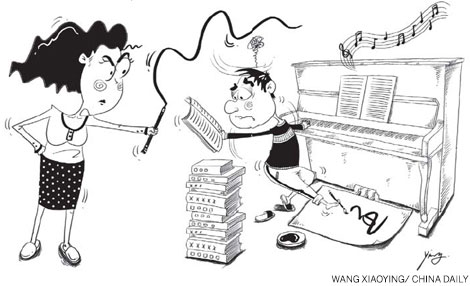Nothing wrong with education system

Amy Chua's Battle Hymn of the Tiger Mother - especially its excerpt, Why Chinese Mothers are Superior - has sparked a debate over Chinese-style parenting and raised concern for two reasons:
First, the Chinese American author, mother of two daughters and a professor of law in Yale, has laid out the "ten commandments" for her daughters. For instance, the Chua sisters have to get A grades in all subjects and are not allowed to spend the night at any friend's place. Their mothers kept them focused on their studies, and didn't allow them to be distracted by extracurricular activities.
Second, this rigorous regime helps the Chua sisters shine in their studies. The elder sister is known for her piano recital at the Carnegie Hall, and the younger boasts an excellent academic record. And Amy Chua attributes her daughters' achievement to her Chinese-style parenting strategy.
Readers have responded to the book in two ways. A survey of Chinese netizens' shows 60.7 percent of respondents agree with her views. But people in the West are less enthusiastic about the Chinese parenting style and warn that it could kill children's creativity and innovativeness.
Lawrence Solomon has cited statistics in his recent column in Canada's Globe and Mail to show the failure of Chinese parenting. He writes that only 10 ethnic Chinese scientists outside the Chinese mainland have won the Nobel Prize in the past century. In contrast, American scientists have won more than 300 Nobel prizes, and Jews, who account for only 1 percent of the world's population, have got at least 180 - or almost one-fourth - of the prizes.
Many Westerners call people like Amy Chua, who they think disregard children's preferences, "tiger mothers". On the other hand, many Chinese parents believe that they care more about and are willing to make greater sacrifices for their children than their Western counterparts. Such disagreement is understandable, given the differences between Eastern and Western cultures and traditions.
The truth is that no culture or tradition, whether Eastern or Western, is superior or inferior. The same applies to Eastern and Western education systems. Both sides should stop using their concepts and values to judge the other. Rather, they should learn the good aspects of each other's systems and clear the misunderstandings.
 0
0 






